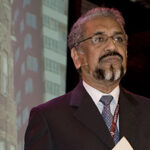Integrate economic policies that include a sound base for domestic businesses and entrepreneurship; lessening of informality; increase in workforce participation of women, the elderly, and the disabled; address skill training and apprenticeships to vulnerable groups; facilitate worker retention with subsidies and emergency reductions in social security contributions; grow the green products and services and renewable energy industries to stimulate the economy while lessening the damage to the environment and creating an estimated 15-60 million green jobs… The XIIth Club de Madrid Annual Conference Societies that work. Jobs for Inclusion a Call to the G20 has identified 13 sets of proposals that will soon be presented to the Australian G20 Presidency.
A diagnosis on how to create decent jobs and foster inclusive growth has been crafted by the Members of the Club de Madrid plus 100 high level international experts from academia and organizations like the UN, ILO, OECD, World Bank, Asian Development Bank, Gallup or Green Cross International. The gathering was enriched with video contributions from Kofi Annan former UN Secretary General, Christiana Figueres, maximum UN authority on Climate Change and Guy Ryder, Director General of the meeting’s knowledge partner, the International Labour Organization.
Societies that Work. Jobs for Inclusion a Call to the G20 was hosted by Australian MP and Joint Secretary General of the World Leadership Alliance, Clive Palmer, and co-sponsored by Queensland Nickel, Mineralogy and the Nizami Ganjavi International Center, from Azerbaijan.
Here are some of the obstacles identified and proposed solutions:
Obstacle 1 – Growth of NEET population (young people neither in employment or education)
Proposals: Increase aggregate demand and access to finance; education and training initiatives for long term employment with the possibility of advancement and careers; targeted employment of disadvantage youth, support for entrepreneurship; fair labor rights up to international standards.
Obstacle 2 – Widespread informality (vulnerable employment encompassing informal working arrangements, adverse conditions, little, if any, social security, and lack of a societal voice)
Proposals: Promote policies on productive and social inclusion, including access to credit, skills, and land, support for social enterprise, social innovation, and cooperatives, as well strong social assistance programs. In other words, “formalize informality”. Provide incentives to employers according to target groups (eg: youth, longer term unemployed etc )
Obstacle 3 – Pressure for increased flexibility of labor markets, while international capital grows highly mobile and unskilled labor remained limitedly mobile.
Proposals: Accompany the existing shift toward high skills with increased education and skills training for all, and redistribute income policies.
Obstacle 4 – Promotion of job protection (such as unions) without damaging the prospects of the majority without such security.
Proposals: Facilitate worker retention with subsidies and emergency reductions in social security contributions.
Obstacle 5 – Exclusion of employment from the MDGs, instead naming it a target under the goal: “Eradicate extreme poverty and hunger.”
Proposals: Use the post-2015 platform to underscore the importance of employment, explaining its close links with other goals including reduction of inequality.
Obstacle 6 – Lack of technological ability to fully monitor changes in employment.
Proposals: Foster a “data revolution” to develop the technology for monitoring employment and inequality goals.
Obstacle 7 – Ecosystem goods and services have never been expressed in economic terms, yet are inextricably linked. The growth model of these goods and services has been proven unsustainable. Proposals: Grow the green products and services and renewable energy industries to stimulate the economy while lessening the damage to the environment and creating an estimated 15-60 million green jobs.
Obstacle 8 – Difficulty of transitioning production processes, technologies, and jobs to a greener economy
Proposals: Support close cooperation between government and social partners, such as the case of Germany’s public-private partnership in renovating buildings for increased energy efficiency.
Obstacle 9 – Widening of inequality due to decline in the wage share of output.
Proposals: Improve wages (at least in line with productivity) for low income workers while strengthening social security systems.
Obstacle 10 – “The unemployed or underemployed graduate is one of the most dangerous of all political actors.”
Proposals: Provide opportunities for graduates to get jobs that fit their skill levels, thereby decreasing the feeling of “relative deprivation” and the likelihood of rebellion or violent conflict.
Obstacle 11 – Lack of jobs reduces trust and civic engagement, which can lead to unrest and violence.
Proposals: Integrate economic policies that include a sound base for domestic businesses and entrepreneurship, lessening of informality and unemployment, increase in workforce participation of women, the elderly, and the disabled, and address skill training and apprenticeships to vulnerable groups.
Obstacle 12 – Unemployed, poorly educated, unmarried men are prime targets for recruitment by groups (such as gangs and militias) that cause unrest.
Proposals: Increase employment opportunities for this group in the short term, while in the long term seek to change the social structure that creates such disadvantaged populations.
Obstacle 13 – Post-conflict situations can demonstrate the fragility of civic society, which can lead to a less-secure peace.
Proposals: Create stability through economic opportunities: reintegration of ex-combatants into the workforce, peace through economic security, and the groundwork for future development.


















